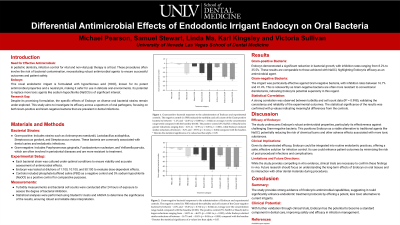Pulp Therapy
225 - Differential Antimicrobial Effects of Endodontic Irrigant Endocyn on Oral Bacteria


Michael Pearson, DMD
Resident
UNLV School of Dental Medicine
UNLV School of Dental Medicine
North Las Vegas, Nevada, United States- LR
Lee R. Roundy, Program Director, Pediatric Dentist
UNLV SDM Pediatric dental residency
Las Vegas, Nevada, United States
Presenting Author(s)
Program Director(s)
Purpose:
This study aimed to evaluate the antimicrobial effectiveness of Endocyn, a novel root canal irrigant containing hypochlorous acid (HOCl), against various oral bacterial species. The study further sought to compare its efficacy to the widely used sodium hypochlorite (NaOCl).
Methods:
An in vitro study was conducted involving both gram-positive and gram-negative bacteria. The gram-positive species tested included Actinomyces naeslundii, Lactobacillus acidophilus, Streptococcus gordonii, and Streptococcus mutans. The gram-negative species included Porphyromonas gingivalis, Fusobacterium nucleatum, and Veillonella parvula. Bacterial growth was assessed after exposure to Endocyn at various concentrations. Sodium hypochlorite (NaOCl) served as the positive control, while phosphate-buffered saline (PBS) was used as the negative control. Statistical analyses were performed using Student's t-test and ANOVA.
Results:
Endocyn demonstrated significant inhibition of bacterial growth, reducing gram-positive bacteria by -8.2% to -35.5% and gram-negative bacteria by -16.7% to -41.4%, results comparable to those with 5% NaOCl. Notably, gram-positive bacteria exhibited resistance at lower concentrations of Endocyn but were effectively inhibited at higher concentrations. In contrast, gram-negative bacteria were consistently inhibited across all tested concentrations.
Conclusion:
The study concludes that Endocyn exhibits strong antimicrobial activity against both gram-positive and gram-negative oral bacteria, similar to the established efficacy of sodium hypochlorite. These promising results highlight Endocyn's potential as an effective endodontic irrigant, warranting further clinical investigation.
Identify Supporting Agency and Grant Number:

.jpg)